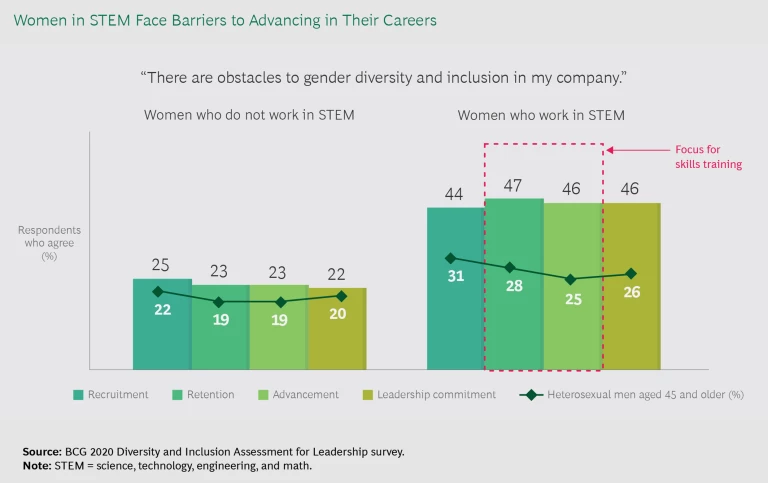Companies can’t hire people fast enough to fill roles that require digital skills and other advanced technical competencies. And yet, they may be ignoring a source of untapped potential—namely, female employees who have science, technology, engineering, and math (STEM) skills.
By offering both women in STEM and women not currently in STEM more opportunities to gain new skills, companies can create the workforce that they need for the future and increase the number of women in STEM who advance into leadership roles.
These are some of the findings in a new report by Boston Consulting Group and the Women’s Forum for the Economy & Society, an international platform that promotes women’s views on economic and social issues. The report, Unlocking Women’s Leadership Through STEM Skills Programmes, is based on a BCG survey of approximately 10,000 women and men in STEM and non-STEM roles in a dozen G20 countries.
BCG undertook the survey to understand the barriers to obtaining new skills that women in STEM face, the skill-building opportunities that could help them advance in their careers, and their preferred settings for learning new skills.
Building Skills Can Serve as a Path to Leadership
Although women make up 39% of the global workforce and have held jobs that require skills in STEM for decades, they represent only 25% of the STEM workforce worldwide and a mere 9% of IT companies’ CEOs.
Our research found that by offering skill-building opportunities, companies can address the decline in the number of women in the STEM leadership pipeline. The rates of retention and promotion are lower for women in mid- and higher-level STEM jobs than the rates for men in similar positions.
We found that women in STEM, and in particular women aged 34 and younger, value learning new skills as a path to job changes and promotions. And when organizations offer STEM skills training, they make themselves attractive not only to women but also to all in-demand talent, because the vast majority of both male and female STEM professionals are eager to pick up new skills.
Addressing Gender Diversity Is Critical
Worldwide, the vast majority of women in STEM are eager to gain new skills that could help them advance in their careers. However, almost half of the respondents said that they face obstacles to gender diversity where they work—double the number of participants in non-STEM positions that said the same. We also found that women in STEM experience limitations throughout their workplace, including in recruiting, retention, advancement, and commitment from leadership. (See the exhibit.)
The share of women in STEM reporting obstacles to gender diversity is even higher in countries such as China and India, where more than two-thirds said that they faced such barriers.
How Companies Can Create the Workforce They Need
To improve STEM skills and help women advance in STEM jobs, companies must first calculate the gap between the results generated by their current gender diversity practices and their goals. Then companies can build a STEM curriculum that addresses the gap, preferably one that is grounded in real work and suited to female employees’ needs and preferences. Employers also must provide time for skills training and promote these opportunities through relevant channels, such as women’s networks or employee support groups.







